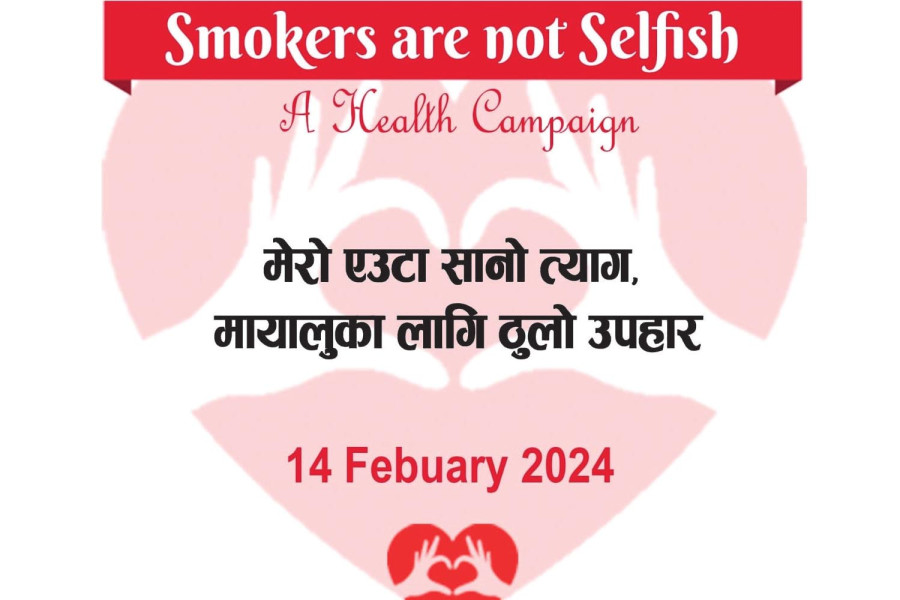Health
‘Smokers are not selfish’ campaign to motivate people to quit smoking
Tobacco claims 1.6 million lives every year in the South-East Asia region, which is among the largest producers and consumers of tobacco products in the world.
Post Report
A 35-year-old man from Lalitpur tried to quit smoking 20 t0 25 times in the past but failed every time.
“I feel I would succeed 100 percent this time in quitting smoking,” reads a text message sent by the man to Dr Om Murti Anil, an interventional cardiologist. “You motivated me to quit cigarettes. If possible I will meet you when I completely stop smoking.”
This is a common refrain among hundreds of people who have vowed to quit smoking with Dr Anil, who is initiating an aggressive awareness campaign with the slogan “A small sacrifice from me, a big gift for my loved one” to motivate people to quit smoking.
“I want to challenge people to prove ‘smokers are not selfish’,” said Anil. “Smoking harms the health not only of smokers but also of their family members. An entire family gets saved if one quits smoking.”
Tobacco use is a major risk factor for non-communicable diseases (NCD) including cancers, cardiovascular diseases, chronic lung diseases and diabetes. It is the world’s leading cause of preventable deaths and kills nearly 8 million people every year. Likewise, 1.3 million people die from secondhand smoking.
It claims 1.6 million lives in the WHO South-East Asia Region, which is amongst the largest producers and consumers of tobacco products in the world. The region has 266 million smokeless tobacco users of the 355 million globally. The growing use of new and emerging products such as Electronic Nicotine Delivery Systems/E-cigarettes and the social use of sheesha/hookah are additional challenges to tobacco control, experts say.
The campaign, set to kick off on February 14 on the occasion of Basanta Panchami, also coincides with Valentine's Day.
“It will be a great gift to the loved one if one quits smoking, so I choose February 14 to begin the campaign, ” said Anil. “I wish for all to prioritise family over smoking. As per the Hindu calendar, it is also the day to start good things and what could be better than renouncing smoking on that auspicious day.”
As many as 28 percent of men and five percent of women in Nepal smoke tobacco, according to the final report of the Nepal Demographic and Health Survey-2022, a nationwide study carried out by the Ministry of Health and Population in 2022.
The study shows 17 percent of men smoke on a daily basis, while 11 percent occasionally do. Among men who smoke, a majority (54 percent) smoke less than five cigarettes per day on average. More men use smokeless tobacco than women—35 percent versus three percent. Overall, half of the men (50 percent) and only seven percent of women in Nepal use any type of tobacco.
There has been a decline in the proportion of women who smoke any type of tobacco since 2001—from 25 percent to 5 percent. Similarly, the proportion of women who smoke cigarettes declined from 23 percent in 2001 to four percent in 2022. Among men, the proportion of who smoked any type of tobacco dropped from 45 percent in 2001 to 28 percent in 2022.
The proportion of women who smoke any type of tobacco increases with age, from one percent among those in the age group of 15–19 to 13 percent between the age of 45 and 49 years.
Women and men with more than secondary education (three percent and 25 percent, respectively) are less likely to use any type of tobacco compared to those with no education (16 percent and 73 percent, respectively).
The use of tobacco is also the leading cause of cancer and death from it. According to the World Health Organization, tobacco kills 27,137 people in Nepal every year.
Study shows that a patient suffering from tobacco-related cancer in Nepal spends around Rs1 million on average on the diagnosis and treatment of the disease, says the finding of a report published recently.
Approximately a sixth of the patients have sold their property for treatment, according to the report titled ‘Cost analysis of diagnosis and treatment of tobacco-related cancer’ carried out by Action Nepal, a non-governmental organisation that promotes tobacco control activities in the country.
The report shows that each patient’s average direct medical cost was found to be Rs588,740 (60 percent) in 2019, whereas the average direct non-medical cost was Rs123,147. Wage loss due to ailment was 27 percent.
The average age of the patients suffering from tobacco-related cancer was found to be 53.5 years. Of the total respondents, 46 percent were found to be illiterate and 1.9 percent had higher education.
The government provided Rs100,000 for the treatment of cancer to each patient, which is less than a quarter of the total treatment cost, according to the report.
The survey, which was also carried out separately in all seven provinces, found that 36.6 percent of the respondents used tobacco products in Lumbini Province, 33.8 percent in Sudurpaschim Province, 29.7 percent in Karnali Province, 29.4 percent in Madhesh Province, 25.9 percent in Gandaki Province and 22.2 percent in Bagmati Province.




 11.12°C Kathmandu
11.12°C Kathmandu














